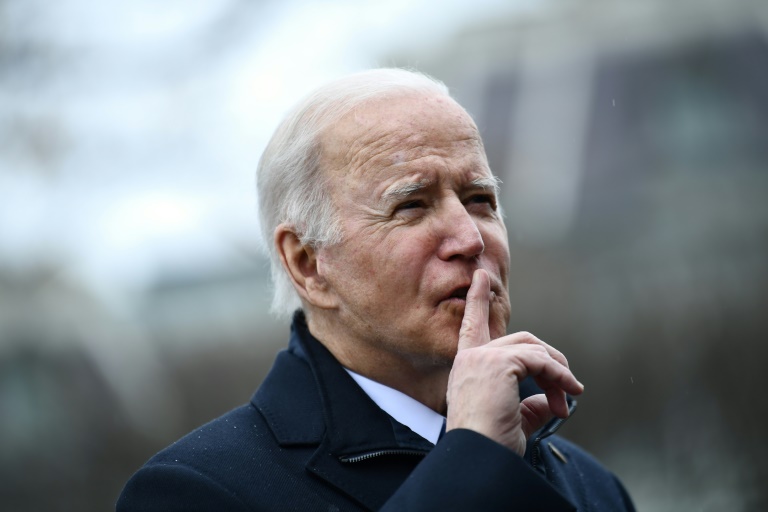President Joe Biden said Wednesday he’s warned President Vladimir Putin that Moscow will face economic sanctions “like none he’s ever seen” should Russian troops massed on the Ukrainian border launch an attack.
The dramatic warning came a day after Biden and Putin talked for two hours by video link, and the US leader said his Russian counterpart got “the message.”
“I made it very clear if in fact he invades Ukraine there will be severe consequences, severe consequences — economic consequences like none he’s ever seen or ever have been seen,” Biden told reporters at the White House.
But Biden added that sending US troops to confront Russia was “not on the table.”
Adding to diplomatic pressure on the Kremlin leader, new German Chancellor Olaf Scholz warned of “consequences” for the Nord Stream 2 pipeline, a huge Russian project to deliver natural gas to Germany.
France’s foreign ministry said in a statement that Russia would face “strategic and massive consequences.”
And US Secretary of State Antony Blinken said he’d heard a similar message during talks with the president of the European Council, Charles Michel.
They “agreed on the need to impose swift and severe costs on Russia if it escalates its aggression in Ukraine,” State Department spokesman Ned Price said.
– Russia’s self-defense argument –
Putin, however, justified Russia’s movement of up to 100,000 troops to the border of Ukraine as a defensive measure amid fears in the Kremlin that the one-time Soviet republic is being pulled into NATO’s sphere.
“Russia has a peaceful foreign policy, but has the right to defend its security,” Putin said at a news conference with Greek Prime Minister Kyriakos Mitsotakis.
“We cannot but be concerned about the prospect of Ukraine’s possible admission to NATO, because this will undoubtedly be followed by the deployment of appropriate military contingents, bases and weapons that threaten us,” he said.
The Russian leader stressed that NATO expanding eastwards is a “very sensitive” issue for Moscow.
Ukraine’s Western-leaning government wants to join the NATO military alliance but is nowhere close to being admitted.
Russian troops already occupy Ukraine’s Crimea peninsula and Russian-backed separatist forces have carved out a pro-Moscow territory covering a swath of eastern Ukraine.
– US troops?
–
Biden said that in addition to economic measures, a new Russian attack on Ukraine would trigger a bolstered US military presence on the territory of existing NATO allies in eastern Europe.
“We would probably be required to reinforce our presence in NATO countries to reassure particularly those in the eastern front.
In addition to that, I made it clear that we would provide a defensive capability to the Ukrainians as well,” he said.
The United States already works closely with the Ukrainian military and has provided millions of dollars in weaponry.
However, Biden said that sending US troops to defend Ukraine without NATO agreement was ruled out for now.
“The idea the United States is going to unilaterally use force to confront Russia invading Ukraine is not on the cards right now,” Biden said.
“We have a moral obligation and a legal obligation to our NATO allies under Article Five. It’s a sacred obligation. That obligation does not extend to… Ukraine.”
“But it would depend upon what the rest of the NATO countries were willing to do as well,” Biden said, seemingly leaving the door to intervention open just a crack.
Regarding Russia’s contention that NATO expansion into its former Soviet strongholds poses a threat, Biden said Moscow and the major NATO allies were working at a high level on “whether or not we could work out any accommodations as it relates to bringing down the temperature along the eastern front.”
Ukraine’s President Volodymyr Zelensky, who has said he is ready to negotiate with Putin, welcomed Tuesday’s video summit.
“I think it’s positive that the president of the United States spoke with the president of Russia,” said Zelensky, who is due to hold talks with Biden on Thursday.
The White House said that after calling Zelensky, Biden would then host a conference call with NATO’s Eastern European members: Bulgaria, the Czech Republic, Estonia, Hungary, Latvia, Lithuania, Poland, Romania and Slovakia.
Biden will “brief them on his call with President Putin, hear their perspectives on the current security situation, and underscore the United States’ commitment to transatlantic security,” a White House statement said.
burs-sms/sst











